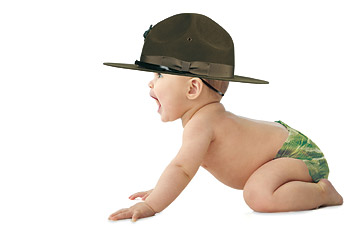
"The societal view of dads is that we're bumbling fools," Steve Dubin tells his all-male audience. It's Saturday morning in Weymouth, Mass., and 14 soon-to-be fathers are paying him to help keep them from fulfilling that stereotype. Dubin, a p.r. executive and Little League coach, pairs three rookies with three dads willing to hand over their babies for training purposes. Support the head, the instruction begins. Act naturally because babies can smell fear. Roll them over and rub their backs if they start to cry. "You'll probably hold the baby differently from your wife. That's O. K.," Dubin says. "But this will be the beginning of, 'Why are you doing it that way?'" he warns. "Tell your wife, 'We're going to do things differently, and you have to allow me to.'"
The marital advice comes as a bonus in the class Dubin and former Air Force special-ops commando Darryl Wooten teach each month called Boot Camp for New Dads. The training program, which is offered in 43 states as well as in Britain and Australia, combines the basics of parenting preparation--what to expect during labor, how to change a diaper--with male-bonding to help ease the often overlooked stresses of fathers-to-be. At a time when enrollment in childbirth classes has fallen from 70% of first timers in 2002 to 56% in 2006--with the drop-off due in part to expectant couples' assuming they can learn just as much from books or online--Boot Camp has continued to expand and this year graduated its 200,000th enlistee.
It's no coincidence that more men are volunteering for three-hour pre-papa classes as marketers ply them with more masculine baby gear. Diaper Dude bags and DadGear diaper vests, which come with pockets for a changing pad and other essentials, are becoming modern-dad must-haves. On June 8, every Babies "R" Us in the U.S. is scheduled to host a Boot Camp session as part of a free event for fathers. And Johnson & Johnson recently signed a partnership with Boot Camp to help get men more involved in child care (and presumably buying more J&J products).
Boot Camp was founded in Irvine, Calif., in 1990 by Greg Bishop after friends kept asking the now 57-year-old father of four, and sibling of 12, for child-rearing advice. His nonprofit program, which can cost nothing or as much as $35 depending on the location, has since been named a best practice by the Department of Health and Human Services and the U.S. Army, which supports classes on its bases. Bishop's latest book, A Crash Course for New Dads, has a built-in audience. According to a 2007 Spike TV survey of more than 1,000 fathers, 71% of respondents felt they had to figure out on their own how to be a good dad. Tim Frye agrees. A political-science professor and Boot Camp veteran, he brought his 11-week-old son to the Weymouth class to help other men learn how to be a more hands-on parent. "If you come from an Ozzie and Harriet--type family where Dad was working and Mom was home," says Frye, 44, "if that's your model, then you're just making it up as you go along."
Boot Camp is working against the old notion that real men, manly men, skip the dirty work when it comes to child-rearing. "There was a time when men would brag that they never had to change a diaper," Dubin tells the class, "but that's not something to brag about now." Instructors reach their audience using guy talk: first-time expectant dads are "rookies"; "veterans" who have taken the class come back with their "stunt babies" so that students can learn to hold, diaper and "burrito wrap"--er, swaddle--them.
The curriculum, which covers serious subjects like shaken-baby syndrome and postpartum depression, for the most part steers clear of touchy-feely emoting. But to kick off the class, Dubin asks the men to describe the father figure they grew up with and the kind of dad they'd like to be. Some responses are blunt: "My dad was an a__hole, and I'd rather not be one." But nearly all include a desire to attain the virtues of a decidedly modern man: patience, emotional availability, anger-management and communication skills, and open-mindedness.
That may sound like a list of what women want from their mates, but Boot Camp addresses what men want too. Bishop says a major concern for expectant fathers is how their relationship with their wives or girlfriends will change. "New mothers are very focused on that baby," he says, "and dads can get left in the dust." That's not only because of the maternal instinct but also because there are some things men simply can't do. A veteran at the Weymouth class told the rookies that his wife originally had trouble breast-feeding. "The milk wasn't coming in," he said. "The baby's weight was dropping. You feel totally helpless." The coaches stress communicating, but they also get to the more pressing questions about sex: when it's O.K. to do it after childbirth ("Officially, six weeks, but not until she's ready") and why engorged breasts aren't meant to be played with ("They feel like someone kicked you in the nuts 10 times").
Despite the popularity of Boot Camp and other father-oriented programs, there are still some bumps on the path to daddy enlightenment. Although many men sign up for Boot Camp after seeing an ad or getting a recommendation from friends or doctors, about half the participants go because their baby's mama makes them. "On my way here, I talked to three friends. They were all like, 'Why are you going to that?'" says Alex Brookfield, 27, a general contractor in the Weymouth class. "But I figured if I learned just a little bit of anything, it would be better than nothing."
